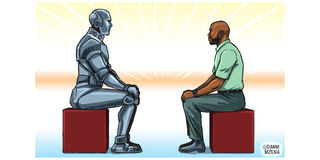What ‘Roz’ the wild robot teaches us about being human

What you need to know:
- While the story gives us plenty of adventure, it also sneaks in some surprising life lessons.
What happens when you take a robot programmed for efficiency and drop her into the wild, surrounded by animals, unpredictable weather, and pure chaos? You get Roz, the titular character from The Wild Robot by Peter Brown.
While the story gives us plenty of adventure, it also sneaks in some surprising life lessons.
Roz might be made of metal, but her journey is as human as it gets.
So Roz arrives on the island with no survival skills—she’s essentially a walking instruction manual, only less helpful. But rather than short-circuiting at the first sign of trouble, she learns to adapt.
She camouflages herself, communicates with animals, and becomes a wilderness expert faster than most of us can figure out how to set up a tent.
The takeaway? Life is full of curveballs, and you have to roll with them.
Whether it’s mastering a new skill or surviving yet another family group chat, adaptability is the ultimate life hack.
The Robot might not have a heart, but she sure acts like she does.
When she adopts an orphaned gosling, she doesn’t just care for him—she becomes a full-blown supermom, learning everything from bird parenting to protecting her little one from predators.
Roz’s kindness is infectious, melting even the most sceptical animals’ icy exteriors.
Her actions remind us that being kind doesn’t cost a thing (unless you’re a robot, in which case it might cost a bit of battery life).
Build a Squad
Roz quickly realises that surviving in the wild isn’t a one-robot job. She befriends squirrels, otters, and even grumpy raccoons, creating an unlikely alliance of animals.
Together, they tackle everything from harsh winters to predators, proving that teamwork really does make the dream work.
The lesson? Life’s challenges are easier to face with the right crew. Whether it’s tackling a work project or simply getting through Monday, don’t be afraid to lean on others.
Labels are for boxes, not people. Roz is a robot designed to perform tasks. That’s it. But by the end of her journey, she’s a carer, friend, and even a community leader. She wasn’t “built” to be any of these things—she just learnt along the way.
The message? Don’t let your label—or anyone else’s opinion—define you. Whether you’re trying out a new hobby or switching careers, embrace the idea that you can be whoever you want to be.
Let’s face it: most robot stories involve machines rising up and wiping out humanity.
But Roz? She’s a different kind of robot—one who builds relationships, helps others, and uses her programming for good.
It’s a nice reminder that technology isn’t inherently bad. It’s how we use it that matters. So, instead of fearing the next gadget, think about how it can make life better (or at least help you avoid doing laundry for another day).
Roz’s story is about more than survival—it’s about finding your purpose, adapting to challenges, and leading with kindness.
She doesn’t just endure the wild; she thrives in it, making friends and teaching everyone around her (including the reader) a thing or two about living a meaningful life.
So, if you’re feeling stuck or overwhelmed, take a page from Roz’s book. Be kind. Be curious.
And remember: even if you’re a little out of your element, you can still figure it out. Who knows? You might even surprise yourself.
In the end, Roz shows us that being human isn’t about biology—it’s about connection, resilience, and a willingness to grow. And if a robot can learn all that, what’s stopping the rest of us?





